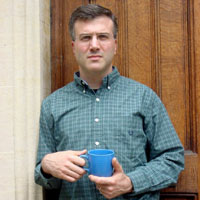Peter Lipton facts for kids
Quick facts for kids
Peter Lipton
|
|
|---|---|

Peter Lipton
|
|
| Born | October 9, 1954 |
| Died | 25 November 2007 (age 53) |
| Alma mater | Wesleyan University Oxford University |
| Era | Contemporary philosophy |
| Region | Western philosophy |
| School | Analytic philosophy |
|
Main interests
|
Philosophy of science, epistemology |
Peter Lipton (born October 9, 1954 – died November 25, 2007) was an important thinker. He was a Professor and led the Department of History and Philosophy of Science at Cambridge University. He was also a member of King's College. Sadly, he passed away unexpectedly in November 2007. Many people saw him as one of the best philosophers of science and epistemologists in the world.
Contents
Peter Lipton's Career
Peter Lipton studied at Wesleyan University and then at Oxford University. Before working at Cambridge, he taught at Clark University and Williams College.
He was part of the Nuffield Council on Bioethics. This group looks at ethical questions in biology and medicine. He also led a team that wrote a report called Pharmacogenetics: Ethical Issues. He was also on the AskPhilosophers panel, where people could ask philosophers questions. In 2004, he received the Medawar Prize Lecturer award from the Royal Society.
What Peter Lipton Studied
Lipton was very interested in the philosophy of science. This field explores how science works and what it means. He studied topics like:
- How we explain things.
- How we make inferences (drawing conclusions).
- How we test ideas.
- How scientific theories change over time.
- What laws of nature are.
- Whether science truly describes reality (called scientific realism).
His work in the philosophy of science also led him to other areas. In epistemology (the study of knowledge), he looked at induction (making general rules from specific observations) and testimony (learning from what others say). He also explored ideas about the mind-body problem in the philosophy of mind.
Peter Lipton's Personal Life
Peter Lipton lived with his wife, Diana, and their two sons, Jonah and Jacob. He described himself as a "religious atheist" and a "progressive Jew". This meant he followed Jewish customs and culture. He used the teachings of Judaism to help him with moral problems. However, he did not believe in the religious ideas like the existence of God.
On November 25, 2007, Peter Lipton had a heart attack after playing a game of squash. He was 53 years old. After his death, Professor John Forrester took over his role at the University of Cambridge.
Selected Writings
Peter Lipton wrote many important papers and books. His most famous book is Inference to the Best Explanation. This book explores how we often choose the best explanation for something, even if we don't have all the facts.
Here are some of his key publications:
- Inference to the Best Explanation, Routledge, 1991; a bigger second edition came out in 2004. ISBN: 0-415-24202-9.
- "The Truth about Science", Philosophical Transactions of the Royal Society B 360 (2005), 1259-1269.
- "Testing Hypotheses: Prediction and Prejudice", Science 307 (January 14, 2005), 219-221.
- "What Good is an Explanation?", in G. Hon & S. Rackover (eds.), Explanation: Theoretical Approaches, Kluwer, 2001, 43-59.
- "The Epistemology of Testimony", Studies in the History and Philosophy of Science 29A (1998), 1-31.
- "Contrastive Explanation", in D. Knowles (ed.), Explanation and its Limits, Cambridge University Press, 1990, 247-266.
 | Janet Taylor Pickett |
 | Synthia Saint James |
 | Howardena Pindell |
 | Faith Ringgold |

